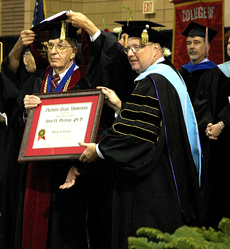On Saturday, the Nicholls community will honor a professor who devoted more than 50 years to the University-who retired and when needed, continues to teach classes for free. The contributions of Alfred Delahaye, professor emeritus of journalism, will be recognized at a tribute dinner inside the Cotillion Ballroom at 6 p.m. Delahaye came to Nicholls in the fall of 1957. The challenge of teaching, and his love of journalism drew him to the University.
“Journalism involves the combining of people, ideas and words. It’s fun and challenging,” Delahaye said. “Journalism is important because it affects everything.”
Delahaye is originally from West Baton Rouge Parish. He attended Louisiana State University, where he received his B.A. and M.A. He then went on to one of the premier journalism schools in the country, the University of Missouri, earning his Ph.D.
The aspect that Delahaye finds most appealing about Nicholls however has been the people. His passion for education can be felt in his words.
“The students are ambitious, they are curious and it’s a total delight,” Delahaye said.
During his 52 years at Nicholls he has seen a myriad of changes. There has been phenomenal growth in many areas. The depth of the course offerings has increased, as well as the expansion of student life opportunities and the integration of the electronic age into the educational system.
Delahaye does have a “pet peeve” that came with the changes however. He is disappointed to see blue jeans everywhere. It’s the rare sight of a pupil in slacks or a female student wearing a skirt or dress, which were so prevalent long ago, that Delahaye would like to see more of on campus.
One of the changes he mentioned in one of his books about the history of Nicholls is the price of education. Delahaye said in 1959, you could get a Nicholls degree for $878. The price included registration, books, lab fees, etc. The most expensive cost was $504, which paid for noontime lunch.
Although he feels that students today are under more emotional stress than students of decades ago, Delahaye said he has noticed improvements in their attitudes.
“Students today compared to those of 30 years ago are more serious and less frivolous,” he said.
Delahaye feels that being enrolled at Nicholls is beneficial to students due to the fact that on a smaller campus they will be taught by a faculty member with a Ph.D., while on a larger campus most teaching is done by graduate assistants.
“A hardworking student at Nicholls can learn more than a complacent student at Harvard or Yale,” Delahaye said.
Perhaps most importantly he believes that today’s faculty is as dedicated and caring as the first was.
The tribute dinner for Delahaye, sponsored by the Department of Mass Communication and friends of Delahaye will begin with a reception, followed by dinner and keynote speakers.
Billy Tauzin, former Louisiana congressman and Nicholls alumnus, will serve as the master of ceremonies.
“We’ve put in close to two years of planning into this event,” James Stewart, department head for mass communication, said.
Nicholls faculty and staff said Delahaye has had a tremendous impact on many people during his career at Nicholls. Not only those in the mass communication department, but anyone around campus that mentions his name speaks of him with the highest regards.
His counsel is still sought by those that work with him.
“Even to this day, if I have an important document that I’m working on I give it to him to look over,” Stewart said.
This dinner will be a chance for those who have valued his opinion over the years to celebrate Delahaye’s achievements.








